737 MAX Fleet Still Grounded as Company Rolls Out First 737 MAX 10
by J. Kasper Oestergaard, European Correspondent, Forecast International.
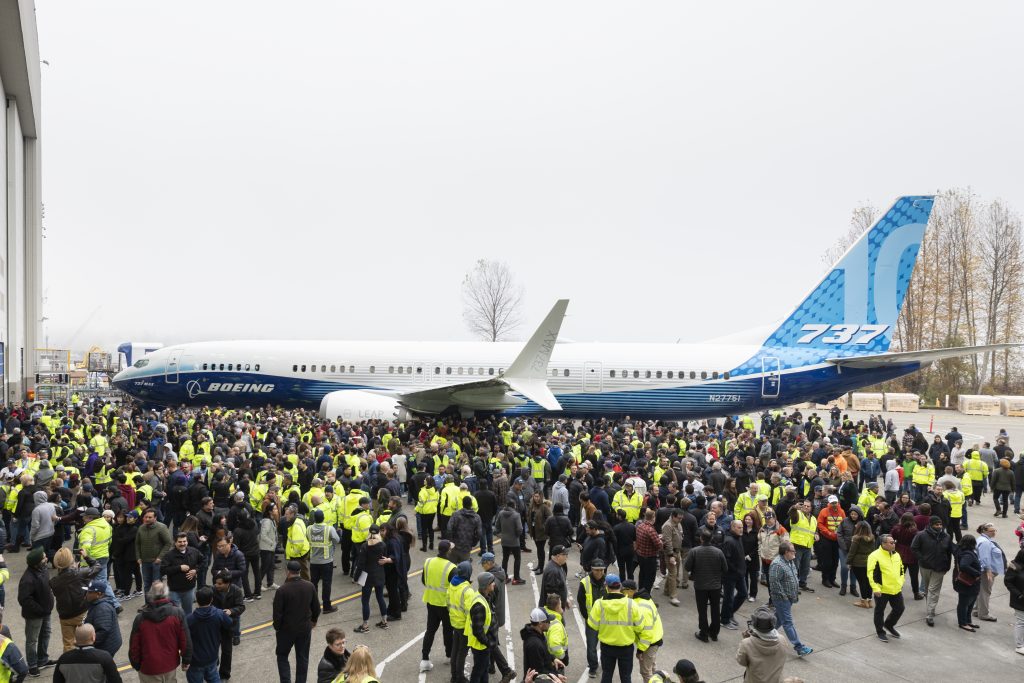
Boeing and Airbus delivered 24 and 78 commercial jets in November 2019, compared to 79 and 89 deliveries, respectively, in the same month last year. With just 345 deliveries this year to date, Boeing is 359 shipments behind last year’s total for the first 11 months of the year. Airbus delivered a total of 725 jets from January to November, compared to 673 during the same period last year. Boeing’s deliveries have taken a severe hit following two 737 MAX crashes and the subsequent deliveries halt and grounding of the fleet. Boeing decided in March to suspend all deliveries of 737 MAX jets. The crashes were with a high degree of certainty caused by the aircraft’s Maneuvering Characteristics Augmentation System (MCAS), which suddenly activated in response to erroneous angle of attack information. In 2018, Boeing delivered 806 jets (763 in 2017), with Airbus handing over 800 (718 in 2017).
In November, Boeing delivered just two 737NGs. Boeing is still producing 737 MAX jets at a reduced rate of 42 aircraft per month and thereby building up an inventory of aircraft ready to be shipped. During 2018, Boeing raised its 737 production rate to 52 and was planning a further increase to 57 per month from the middle of this year. Producing the 737 MAX at a reduced rate allows the company to prioritize additional resources to focus on returning the 737 MAX to flight. In April, the U.S. Federal Aviation Administration (FAA) established a Boeing 737 MAX Joint Authorities Technical Review (JATR) team of experts from the FAA, NASA and international aviation authorities. Since then, Boeing has worked with the FAA and the JATR and tested updates to its 737 MAX software during hundreds of flights. On October 11, the JATR submitted its Observations, Findings, and Recommendations. In its report, the JATR criticizes both Boeing and the FAA for how they assessed and approved the design of the 737 MAX automated flight-control system. Boeing has for months been targeting a fourth quarter 2019 return of the 737 MAX fleet but that now seems increasingly unlikely. Boeing recently stated, “We will work with the FAA to support their requirements and their timeline as we work to safely return the MAX to service in 2020.” To date, Boeing has delivered 387 737 MAX jets. A total of 256 737 MAX jets were delivered in 2018, up from 74 in 2017. In November, Boeing also delivered one 747, five 767s, four 777s and 12 787s. Boeing recently raised the monthly Dreamliner production rate to 14 aircraft. Boeing has handed over 125 787s year-to-date. The company delivered 145 787s in 2018, up from 136 in 2017.
In November, Airbus delivered four A220s, 57 A320s (2 CEO / 55 NEO), five A330s, 11 A350s and one A380. Airbus recently increased the official A320 production rate to 60 aircraft per month and is targeting an additional raise to 63 jets per month from 2021. A total of 386 A320neo family aircraft were delivered in 2018, up from 181 and 68 in 2017 and 2016, respectively. In October 2019, Airbus marked its 1,000th A320neo family aircraft delivery. Airbus has delivered 96 A350s year-to-date, having shipped 93 A350s in 2018 – up from 78 in 2017 – and recently increased the monthly production rate to 10. Airbus is considering a further increase up to 13 A350s per month, but a date has yet to be announced. With the ramp-up of A350 XWB deliveries combined with a higher A320 production rate, Airbus has nearly eliminated Boeing’s deliveries lead in recent years. Following the tragic 737 MAX events, Airbus is certain to deliver more aircraft than Boeing this year.
Turning to the orders race, Boeing had a mixed month in November, logging 63 gross orders but also receiving 52 cancellations, resulting in 11 net new orders. Emirates reduced the number of 777X aircraft it has on order by 35 – from 150 to 115 – but, at the same time placed an order for 30 787-9 Dreamliners. Other Boeing November bookings were 20 737 MAX jets for an undisclosed customer and 10 737 MAXs for SunExpress Airlines, a Turkish carrier based in Antalya. Year-to-date, Boeing has accumulated 240 gross orders (324 cancellations => -84 net new orders). For the full year 2018, Boeing booked 893 net new orders (1,008 gross orders).
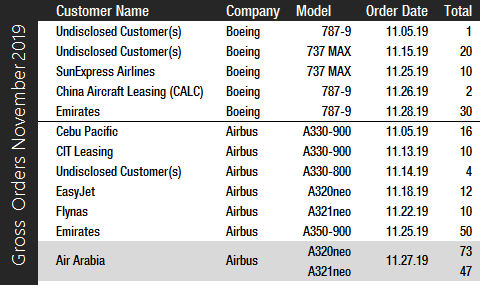
In November, Airbus had a very strong month and booked 222 gross orders (46 cancellations => net of 176). UAE-based Air Arabia ordered 73 A320neos and 47 A321neos (27 A321neo and 20 A321XLR), while Emirates placed an order for 50 A350-900s. These orders were announced at the 2019 Dubai Airshow along with Flynas’ order for 10 A321XLRs. Also during November, Cebu Pacific and CIT Leasing ordered 16 and 10 A330-900s, respectively. Furthermore, EasyJet ordered 12 A320neos. For 2019 to date, Airbus reports 940 gross orders (222 cancellations => net of 718). Of these cancellations, 31 were due to Emirates’ decision earlier this year to reduce its A380 order book. This subsequently forced Airbus to announce that it will cease A380 production in 2021. In November, Emirates decided to cancel an additional 39 A380s on order, reducing Airbus’ total A380 backlog to just 11 aircraft. In 2018, Airbus landed a total of 747 net new orders (831 gross orders), thereby losing the 2018 orders race as Boeing had accumulated 893 net new orders. Airbus had retained an orders lead over its rival every year since 2012.
On November 30, 2019, Airbus’ backlog was 7,570 jets, of which 6,625, or 88 percent, were A220 and A320ceo/neo family narrowbodies. The company’s all-time backlog record high of 7,577 jets was set in December 2018. By the end of November 2019, Boeing’s backlog (total unfilled orders before ASC 606 adjustment) was 5,662 aircraft, of which 4,591, or 81 percent, were 737 NG/MAX narrowbody jets. Boeing’s all-time backlog high of 5,964 aircraft was set in August 2018. The number of Airbus aircraft to be built and delivered represents 9.5 years of shipments at the 2018 production level. In comparison, Boeing’s backlog would “only” last 7.0 years. This year to date, Boeing’s book-to-bill ratio, calculated as orders divided by deliveries, is negative as cancellations have outpaced orders. Airbus’ book-to-bill ratio is 0.99. In 2018, Boeing boasted a book-to-bill ratio of 1.11, with Airbus at 0.93. In 2017, Boeing booked 912 net new orders for a book-to-bill ratio of 1.20. That same year Airbus booked 1,109 net new orders, for a book-to-bill ratio of 1.54.
2019 Forecast
Forecast International’s Platinum Forecast System® is a breakthrough in forecasting technology. Among many other features, Platinum provides 15-year production forecasts. The author has used the Platinum Forecast System to retrieve the latest delivery forecasts and, for 2019, Forecast International’s analysts expect Boeing and Airbus to deliver 707 and 818 large commercial jets, respectively. The forecast 2019 total for Boeing was 904 prior to the second 737 MAX crash and the subsequent grounding of the fleet and temporary cut in the production rate. These are the latest “live” forecast figures (adjusted frequently by our analysts as new information comes in). These figures exclude militarized variants of commercial platforms such as Boeing’s P-8 Poseidon, KC-46 and KC-767 tankers, and C-40; and Airbus’ A330 MRTT tanker.
Prior to the second 737 MAX crash, Boeing announced, in connection with the release of its 2018 earnings report in late January, that it was targeting between 895 and 905 commercial jet deliveries in 2019, a 12-13 percent increase from 2018. Boeing has yet to announce a revised figure and is likely awaiting the 737 MAX’s return to service before providing updated guidance. On February 14, Airbus announced that it aims for 880 to 890 commercial aircraft deliveries in 2019, equal to a 10-11 percent increase from 2018.
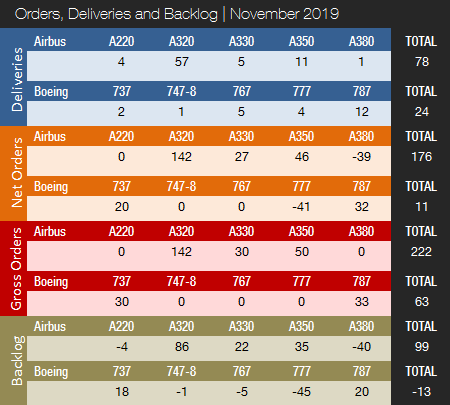
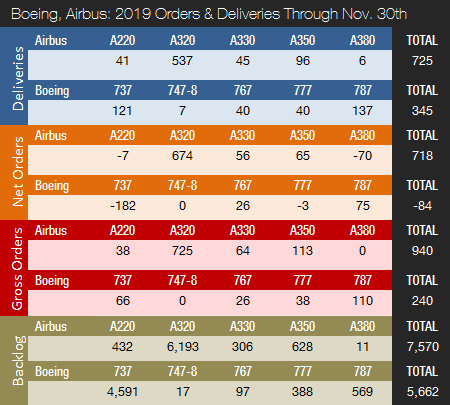

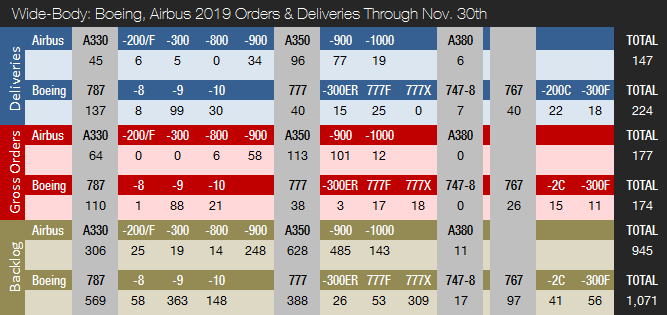
Note: Boeing 777-300ER orders include one 777-200LR. The 777-300ER backlog includes two 777-200LRs.
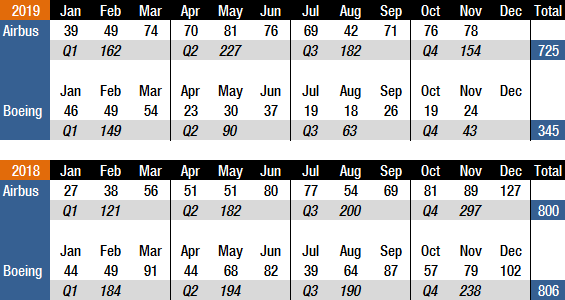

Joakim Kasper Oestergaard is Forecast International’s AeroWeb and PowerWeb Webmaster and European Editor. In 2008, he came up with the idea for what would eventually evolve into AeroWeb. Mr. Oestergaard is an expert in aerospace & defense market intelligence, fuel efficiency in civil aviation, defense spending and defense programs. He has an affiliation with Terma Aerostructures A/S in Denmark – a leading manufacturer of composite and metal aerostructures for the F-35 Lightning II. Mr. Oestergaard has a Master’s Degree in Finance and International Business from the Aarhus School of Business – Aarhus University in Denmark.
References:
- http://www.boeing.com/commercial/#/orders-deliveries
- https://www.airbus.com/aircraft/market/orders-deliveries.html
- https://www.faa.gov/news/updates/?newsId=93206
- https://www.boeing.com/commercial/737max/737-max-update.page
- https://www.flightglobal.com/orders-and-deliveries/a350-order-confirms-emirates-a380-cancellation/135425.article
- https://boeing.mediaroom.com/news-releases-statements?item=130578
- https://www.npr.org/2019/12/12/787646809/faa-chief-pushes-back-on-boeing-pressure-to-return-737-max-jets-to-service?t=1576365289222
- https://www.flightglobal.com/airlines/emirates-retains-777-8s-in-revised-777x-order/135757.article
A military history enthusiast, Richard began his career at Forecast International as editor of the World Weapons Weekly newsletter. As the Internet became central to defense research, he helped design the company’s Forecast Intelligence Center and now coordinates the FI Market Recap newsletters for clients. He also manages two blogs: Defense & Security Monitor, which covers defense systems and international security issues, and Flight Plan, focused on commercial aviation and space systems.
For more than 30 years, Richard has authored Defense & Aerospace Companies, Volume I (North America) and Volume II (International), providing detailed data on major aerospace and defense contractors. He also edits the International Contractors service, a database tracking all companies involved in programs covered by the FI library. Richard currently serves as Manager of the Information Services Group (ISG), which develops outbound content for both Forecast International and Military Periscope.




